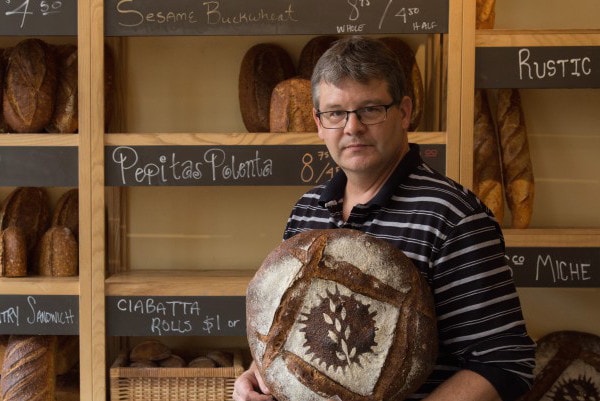Subscribe: Apple Podcasts | Spotify | Amazon Music | iHeartRadio | RSS | More
[vc_row][vc_column][vc_column_text]In Edible-Alpha® episode #23, Tera talks with Dave Lohrentz, co-owner of Madison Sourdough, a bakery, café, patisserie and mill in Madison, WI specializing in sourdough breads and other baked goods made from local and rare grains. Dave started his career as a small business lender before getting an MBA and eventually working at Madison Sourdough as a baker.
Soon after Dave started working at Madison Sourdough, the then owner approached him and a co-worker about buying the business. That co-worker, Andrew Hutchison, and Dave became business partners in a 50-50 split, with family helping them bootstrap the purchase and launch of the business in mid-April 2009 to optimize for the best cash flow for the summer months. At the time he bought the company, it was almost exclusively wholesale in its business model and located in a part of Madison that was retail focused, but with little foot traffic. They knew they would experience more growth and success by locating in Madison’s downtown or near downtown, moving the business to their current location on Madison’s vibrant walkable and bikable near-east side. The company has grown from 7 employees when he bought the business to more than 50 employees today.
They have grown using a vertically integrated business model by adding a restaurant that highlights their baked goods and bakery. They have also added an artisanal grain mill to their production processes, sourcing much of the flour themselves from local producers. Sourcing and milling much of their flour, producing their own baked goods, and then featuring those goods in their restaurant has allowed them to expand their wholesale accounts, build their brand and capture margin on much of the value chain. In their accounting, they have ways of tracking the internal margins of the bakery, café and wholesale lines of business as well as a method of making transfers between those lines to fully understand their financial drivers and make decisions accordingly. While vertical integration has been a source of success, they are intentional about developing and testing new product lines/processes, retiring old products or adding more components to their vertically integrated business. For example, they only sell certain products in wholesale channels because some of their products’ margins only work if they are sold through retail.
Dave has found the need to help develop the markets for non-conventional wheat and other flour sources, but it is difficult to get the local grain supply chain to a robust enough point to have options for multiple actors in the chain. He encourages aspiring entrepreneurs to embrace their passion but to be smart about building their business. Instead of writing up elaborate business plans built on assumptions that may not be true and may change over time, he advocates the lean startup model of trying things, talking to customers, learning from mistakes and pivoting quickly. This process of iterative learning will help food entrepreneurs figure out which ideas are duds and which are the future business opportunities.[/vc_column_text][/vc_column][/vc_row]

